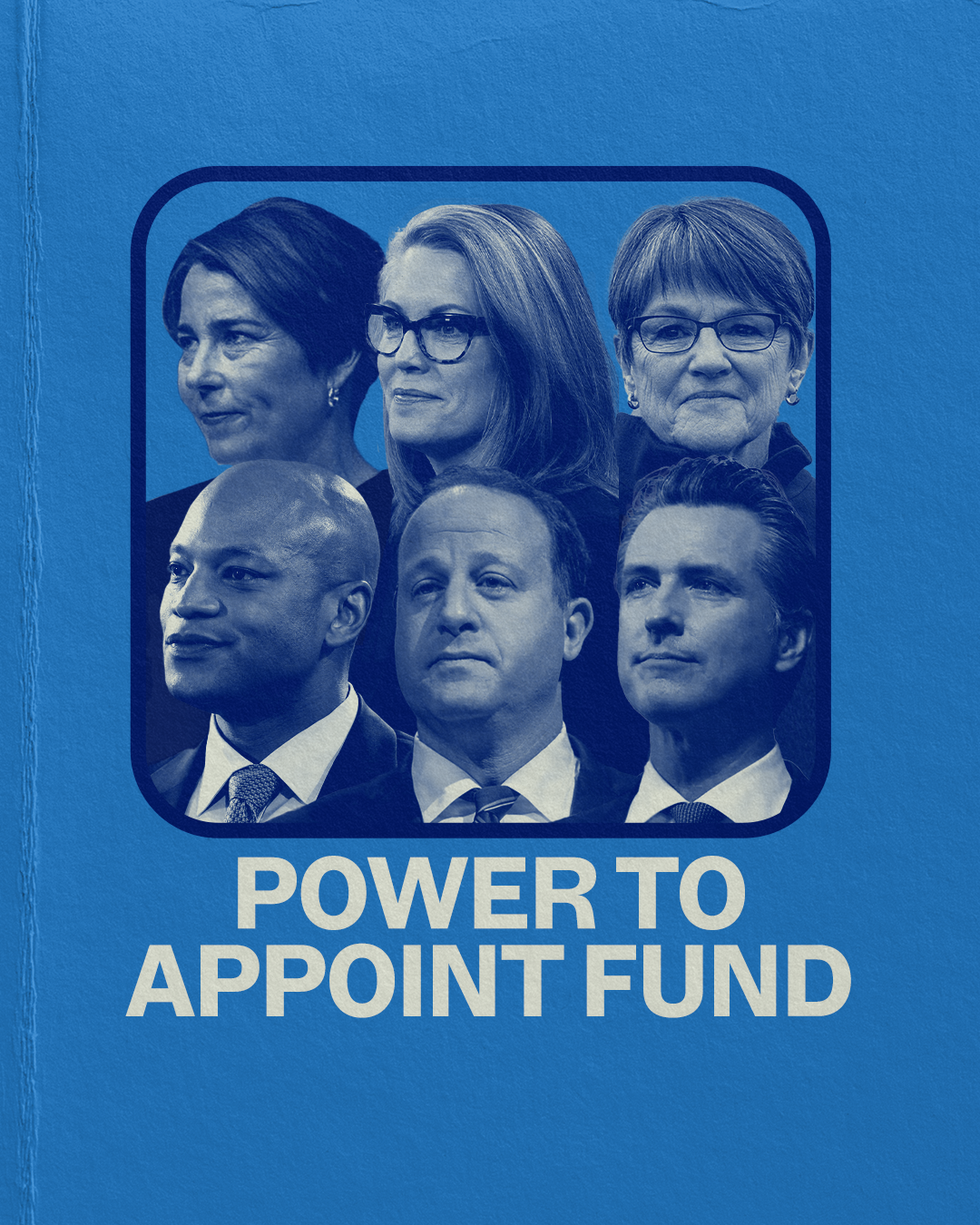
Can you donate now to join our fight?
We just launched the Power to Appoint Fund to highlight the important role Dem Govs play to ensure integrity in our country’s judicial process and protect fundamental freedoms. Your support will ensure we can make crucial investments in key states and protect our democracy. Please don’t wait: rush your gift to elect Democratic governors! >>>
Dem Govs Get It Done: While Republicans Introduce Anti-Democratic Voting Restrictions, Democratic Governors Protect and Expand the Right to Vote
A recent article by the Washington Post highlighted Democratic governors across the country who are dropping barriers to voting as Republicans embrace anti-democratic voting restrictions.
Following a slew of restrictions in states with GOP-controlled legislatures like Georgia, Florida and Iowa, Democratic governors are leading the way by making permanent the practices that led to record-high turnout last year.
“We started getting input pretty early from our residents, saying, ‘This is great — why can’t we do this all the time?’” Nevada Gov. Steve Sisolak said about expanding vote-by-mail.
The Post mentioned Democratic governors Sisolak, Beshear, and Cuomo for their leadership in protecting the right to vote. In stark contrast to Republican restrictions, Govs. Sisolak and Beshear permanently established and expanded vote-by-mail systems. Gov. Cuomo has enacted four new election laws this year and is expected to sign at least eight more.
The action at the state level comes as federal action stalled in Congress this week. While Democratic governors are taking up the mantle, it remains an imperfect solution. “Voting rights really shouldn’t be impacted by boundary lines that are drawn arbitrarily for states,” said Nevada Gov. Steve Sisolak. “It should be the same for everybody. … It shouldn’t be dependent on who is in power and who is not and who is passing the laws.”
The division is clear: Republicans want to restrict the right to vote, and Democratic governors are fighting back.
Read more about the Democratic governors protecting voting rights below:
Washington Post: States across the country are dropping barriers to voting, widening a stark geographic divide in ballot access
More than half of U.S. states have lowered some barriers to voting since the 2020 election, making permanent practices that helped produce record voter turnout during the coronavirus pandemic — a striking countertrend to the passage of new restrictions in key Republican-controlled states this year.
The newly enacted laws in states from Vermont to California expand access to the voting process on a number of fronts, such as offering more early and mail voting options, protecting mail ballots from being improperly rejected and making it easier to register to vote.
Some states restored voting rights to people with past felony convictions or expanded options for voters with disabilities, both long-standing priorities among advocates. And in Virginia, a new law requires localities to receive preapproval or feedback on voting changes as a shield against racial discrimination, a first for states after the Supreme Court struck down a key part of the federal Voting Rights Act in 2013.
The push to make voting easier around the country comes even as Republicans have embraced voting restrictions in GOP-controlled states such as Georgia, Florida and Iowa. Some states have passed laws that make some elements of voting easier and others harder, leading to mixed effects.
But the overall result is a deepening divide in ballot access depending on where voters live — one shaped by how lawmakers have reacted to both the pandemic and former president Donald Trump’s false claims that the 2020 election was tainted by massive fraud.
[…]
The trend is not limited to blue states, though they have led the charge. Indiana and Kentucky made several significant changes this year, including expanding the availability of ballot drop-off locations and establishing processes for voters to correct certain errors that would otherwise invalidate their mail ballots. At least four red states created systems for voters to track their ballots through the mail. Louisiana eliminated hurdles for people with past felony convictions as they register to vote. Montana made voting more accessible for people with disabilities, even as it ended same-day voter registration.
[…]
The uncertainty is heightened by a standoff on Capitol Hill over Democratic-backed legislation to protect voting rights. On Tuesday, Senate Republicans blocked a test vote that would have cleared the way to start debate on the bill, known as the For the People Act, which Senate Minority Leader Mitch McConnell (R-Ky.) vowed to fight.
“States are stepping up in the absence of or while waiting for congressional action,” said Eliza Sweren-Becker, voting rights and elections counsel at the nonpartisan Brennan Center for Justice, adding: “Some of this is really a call to action to Washington.”
Absent federal standards, voters’ experiences will vary widely from state to state in details large and small — from the length of lines on Election Day to the process for registering to vote or casting a mail ballot. Starting this year, the contrast is poised to become more dramatic as the wave of new election laws begins to take effect.
“Voting rights really shouldn’t be impacted by boundary lines that are drawn arbitrarily for states,” said Gov. Steve Sisolak (D) of Nevada, which enacted universal mail voting this year. “It should be the same for everybody. … It shouldn’t be dependent on who is in power and who is not and who is passing the laws.”
The new laws that ease the voting process build on emergency actions taken to protect voters during the pandemic, when public health measures barred many people from leaving home or gathering in public places.
[…]
Under laws passed this year, Vermont and Nevada will mail ballots to active voters for general elections and all elections, respectively. Maryland has created a permanent absentee voter list, which allows voters to sign up to receive mail ballots for every election, and Connecticut and New York are moving toward amending their state constitutions to allow voters to cast mail ballots without an excuse.
So far, nearly two dozen states have taken steps to improve the process of mail voting — agreeing to pay for return postage for ballots, expand the use of drop boxes or give election administrators more time to process returned mail ballots before Election Day, for example.
These moves reflect the popularity of the more flexible voting options during the pandemic and election administrators’ success in implementing them securely for November’s contests.
“We started getting input pretty early from our residents, saying, ‘This is great — why can’t we do this all the time?’” Sisolak said in an interview.
In 2020, active voters in the state received ballots in the mail for both the June primary and the general election. Sisolak noted that Nevada Secretary of State Barbara Cegavske, a Republican, found no evidence to support GOP claims of widespread voter fraud in the state.
“You’re always going to get the naysayers and the haters that are going to complain about the process, but it proved very effective and very secure so I’m happy about it,” he said. The majority-Democratic state legislature approved the new system with Republicans unified in opposition.
[…]
Bipartisan agreement was also critical in Kentucky, where Adams lobbied for a wide-ranging bill to create an early voting period, allow the use of drop boxes and add a process to remedy certain errors on mail ballots, among other elements. (The final law also allows counties to combine precincts and establish centralized “voting centers,” a provision that some critics say could limit voter access at times.)
During the 2020 general election, the state allowed anyone concerned about contracting covid-19 to request an absentee ballot, installed drop boxes for returning mail ballots and offered a three-week early voting period.
[…]
Some blue states are using momentum from the 2020 cycle to replace what critics said were outdated voting restrictions. In the Northeast, several traditionally Democratic states maintained limits on early and mail voting that were loosened during the pandemic and are now receiving fresh scrutiny.
In New York, Gov. Andrew M. Cuomo (D) has enacted four new election laws this year and is expected to sign at least eight more, as Democratic legislators double-down on efforts they began in 2019 to improve voter experience in the state.
[…]
###

